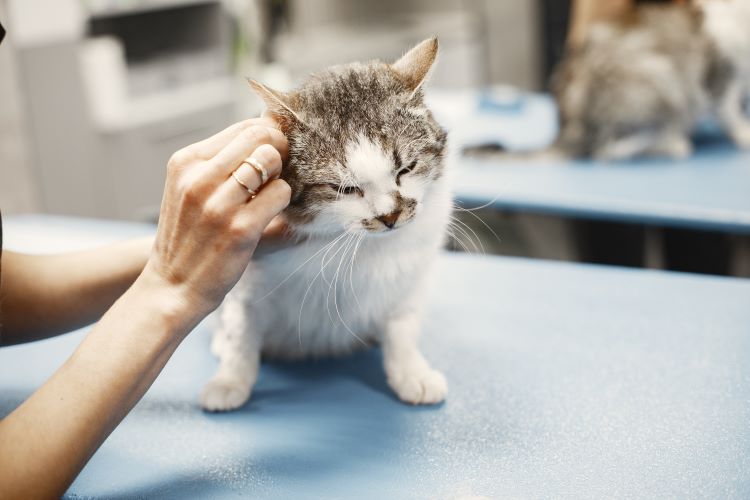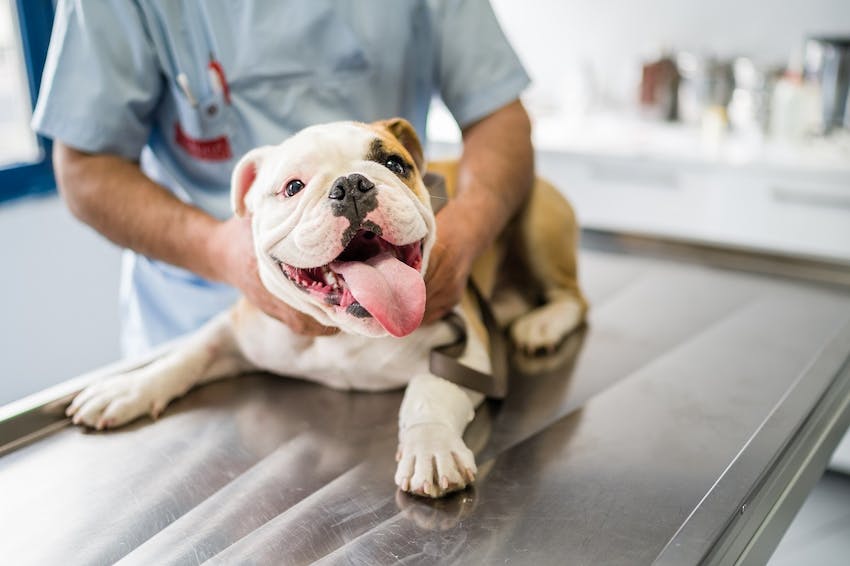Ready to help treat your pet to a healthy life?
How Often Should Your Pet See a Veterinarian?
By : Sam Chambers | Updated Aug 14, 2025

As loving pet owners, it’s our responsibility to ensure the health and well-being of our furry family members. After all, we all want our pets to live long and healthy lives! With this in mind, regular trips to the veterinarian are an absolute necessity.
Just because your pal appears perfectly healthy doesn’t mean they don’t need veterinary care. But just how often should your pet see a veterinarian? When do dogs need to go to the vet, and what about cats? The truth is that it depends on several factors, including your pet’s age, breed, overall health, and lifestyle.
In this guide, we’ll cover everything you need to know about scheduling vet visits for your dog or cat, from routine checkups to emergency care.
Why routine veterinary care matters
Routine veterinary care is critical in keeping your pet healthy and feeling their best. Here are some reasons why you should regularly take your pet to the vet:
Pets are experts at hiding pain
Your pet might appear healthy, but that doesn’t always mean they’re completely pain-free. Both dogs and cats instinctively hide their pain, making it difficult for pet owners to realize their pet isn’t feeling well. An early diagnosis can help save your pet from needless suffering, and treatment is often less expensive and complex when a problem is identified early on.
“Cats are especially good at [hiding pain],” says Trupanion veterinarian Dr. Sarah Nold. “Another thing to consider is that sometimes owners don’t recognize signs of pain, such as hiding, slowing down and/or reluctance to do things they used to. Their veterinarian can advise what to watch for.”
Even if you haven’t noticed any signs of pain in your pet, your veterinarian can uncover hidden problems that the average pet owner might overlook. It’s better to be safe than sorry by regularly taking your pet to the vet.
Pets need a health baseline
To ensure your pet’s lasting health, it’s crucial for your pet to have a thorough and well-documented medical history. Regular checkups are essential for this reason, as the past can help your vet properly evaluate your pet’s current health.
“Hindsight is 20-20 as they say,” Nold says. “It is easier to spot subtle changes/trends with regular check-ups. Often history, combined with a physical exam, is key to making a diagnosis.”
In other words, your pet’s baseline of health makes it easier to determine what’s normal or not normal for your pet.
Preventive care is better (and cheaper!) than reactive care
Regular checkups allow your vet to monitor your pet's health over time and provide preventive care to keep them in tip-top shape. Preventive care such as vaccinations and heartworm prevention are how you can stop potential health issues from developing in the first place.
Plus, preventive care is less costly and unpleasant than treating a health problem after it arises. For instance, administering heartworm preventive to your dog or cat is safer and less expensive than treating heartworm disease.
Problems can be detected early
As part of their annual checkup, your vet will evaluate your pet from head to tail, including their weight, teeth, gums, skin, heart, lungs, and other body systems. They may even run blood work to assess how well your pet’s organs are functioning or conduct a fecal exam to detect intestinal parasites.
With the help of your pet’s medical records, your vet can spot changes in your pet’s health. This is essential for preventing minor health problems from becoming more serious or even life-threatening. And, as mentioned earlier, an early diagnosis is often less costly to treat. According to Nold, some illnesses may even be reversible when caught and treated early enough.
Weight and oral health can be closely monitored
Obesity and dental disease are two of the most common yet preventable health conditions for pets. Both can lead to major and irreversible problems, resulting in life-threatening health risks, a shorter life expectancy, and a lower quality of life.
Almost 60% of all cats and dogs in the US are considered obese or overweight. Regular checkups can help nip both obesity and dental disease in the bud before they cause irreversible damage.
You can establish a relationship with your vet
Visiting your veterinarian gives you the chance to ask questions and discuss any concerns you may have about your pet. Like us, you probably worry about your pet, so regular checkups can help alleviate any pet owner anxiety you may have.
It’s also worth considering your pet’s stress levels around their medical care. The apprehension many of us feel about going to the dentist is similar to how many pets feel when visiting the vet. Some pets can feel more comfortable the more familiar they become with your vet's office and the people working there. Regardless, it’s important to find a veterinary practice you feel comfortable with and can establish a positive relationship with the team.
“Pets can pick up on how their owners are feeling,” says Nold. “So, if the owner is less anxious it makes sense that their pet will also be.”

How often should your pet see a veterinarian?
How often a pet should see a veterinarian will depend on the individual pet. Dogs and cats are as unique as their owners, after all! Still, the age of your pet can serve as a helpful guide in determining how frequently they should receive checkups.
Puppies and kittens (0-1 year)
Puppies and kittens typically need to see the vet every 3-4 weeks until they’re about 16 weeks old for vaccinations, deworming, and general health checkups. Also, puppies and kittens are especially vulnerable to getting sick or injured during their first year of life. As such, younger pets may require even more frequent visits to the vet.
Regular vet visits are also crucial for monitoring your pet’s growth and development. This is especially important for puppies and kittens, as they go through numerous growth milestones during their first year.
Adult dogs and cats (1-7 years)
For most adult dogs and cats, an annual exam is recommended to stay on track with your pet’s vaccine schedule and maintain their health. That said, certain breeds and health conditions may require more frequent checkups.
Bulldogs, for example, with their characteristic skin folds and wrinkles, are prone to skin and ear infections. Regular veterinary checkups can help monitor and manage these issues more effectively. As always, it's important to discuss your pet's specific needs with your veterinarian to determine the most suitable schedule for their health and wellbeing.
Senior dogs and cats (7 years and older)
As dogs and cats age, they’re naturally prone to more health problems and may need to see the vet every 6 months. More frequent visits are crucial for detecting and managing age-related health issues like diabetes, kidney disease, thyroid disease, heart disease, arthritis, and other chronic health problems. Without regular veterinary care, the quality of life for a senior pet may be jeopardized.
It's important to note that aging for dogs and cats is very individualized. Larger breeds tend to age faster, so the larger your pet is, the sooner they may need more frequent checkups.
Reasons your pet might need extra vet visits
Aside from annual or biannual checkups, there may be multiple other reasons your pet should visit the vet:
Your pet is overdue for one or more vaccinations
Vaccines play a vital role in protecting your pet from serious contagious diseases. Most dogs and cats should receive all core vaccines, which protect against various illnesses either common to your area or can be easily spread between pets.
“Core vaccines vary depending on cat and dog and location,” says Nold. “Core vaccines for cats typically are herpesvirus, calicivirus, panleukopenia, rabies, and leukemia. Core vaccines for dogs typically are distemper, adenovirus, parvovirus and rabies.”
Depending on your dog’s lifestyle and risk factors, your vet may also recommend non-core vaccines to protect against things like leptospirosis and Lyme disease.
In order to maintain immunity, pets need regular booster shots every 1-3 years. Depending on the timing, your pet might need a booster before their next scheduled checkup. If your pet isn’t up to date on their vaccinations, they’re at risk of contracting a serious and potentially deadly disease. Instead of waiting, schedule a vet visit as soon as possible to ensure your pet stays current on their vaccinations. Even unvaccinated pets who spend most of their times indoors (like many cats) are at risk of contracting illnesses you may carry in from outside.
Your pet needs help maintaining their oral health
In addition to vaccines, dental cleaning visits might be necessary to help maintain your pet's oral health. Dental disease is one of the most common health issues in pets, affecting the majority of dogs and cats by the age of three. Regular dental cleanings can help prevent dental problems such as tooth decay, gum disease, and bad breath.
During these cleanings, tartar and plaque are removed from your pet's teeth, and their mouth is examined for any signs of dental disease. Depending on your pet's oral health, your veterinarian may recommend dental cleanings once or twice a year.
While at-home pet dental care doesn't negate the need for veterinary visits, it can help improve your pet's oral health. Not sure where to start? Here are some essential pet dental care tips every pet owner should know.
When in doubt, go to the vet
Always follow your veterinarian’s recommended schedule for vet visits. If you notice anything different about your pet’s behavior, don’t wait until your next scheduled appointment to get your pet checked out.
Even small and subtle changes can indicate that something’s wrong. In fact, dogs and cats with behavioral problems may have undiagnosed acute or chronic pain. You know your pet best, so if they aren’t acting like they normally do or seem a little off, trust your gut! Give your vet a call or schedule an appointment.
Other signs such as difficulty breathing, whining, wincing, vomiting, lethargy, or refusal to eat or drink could indicate a serious health issue that requires immediate attention.

How to pay for unexpected or emergency vet visits
Most pet owners can easily budget for routine veterinary care like vaccinations or flea control because these are expected costs that come with having a pet. The cost of injuries and illnesses, on the other hand, are much harder to predict — and nearly impossible for pet owners to budget for.
An emergency vet visit can set you back thousands of dollars. For this reason, some pet owners avoid taking their pet to the vet altogether. Signing up for pet insurance can provide a valuable safety net, helping to alleviate the financial burden of unexpected or emergency vet visits.
With pet insurance, you can focus on providing the best care for your pet without worrying about the cost — leading to a healthier pet for years to come.
